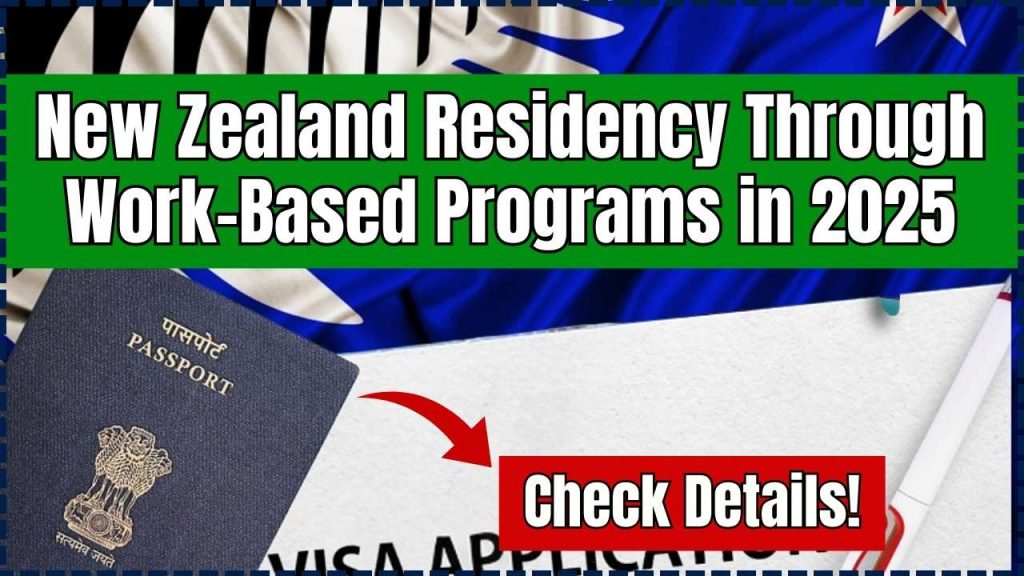New Zealand Residency Through Work-Based Programs in 2025: New Zealand is a dream destination for many professionals worldwide, offering a high quality of life, excellent career opportunities, and a clear pathway to residency. In 2025, New Zealand offers multiple work-based programs that allow skilled workers to secure residency. Whether you’re an IT professional, healthcare worker, engineer, or tradesperson, there are several pathways to make New Zealand your permanent home.

If you’re considering making the move, this guide will break down everything you need to know about work-based residency options in New Zealand. We’ll cover the different visa types, eligibility criteria, application processes, and expert tips to maximize your chances of success. You’ll also find real-world examples, practical steps, and up-to-date statistics to help guide you through this life-changing journey.
New Zealand Residency Through Work-Based Programs in 2025
| Feature | Details |
|---|---|
| Program Name | New Zealand Work-Based Residency Pathways |
| Eligibility | Skilled workers in high-demand fields, accredited employer sponsorship, work experience in NZ |
| Visa Types | Green List Visa, Accredited Employer Work Visa, Skilled Migrant Category Resident Visa |
| Processing Time | 6 months – 2 years, depending on the pathway |
| Age Requirement | Under 55 years |
| Official Website | New Zealand Immigration |
New Zealand’s work-based residency pathways in 2025 offer incredible opportunities for skilled professionals worldwide. Whether you qualify for the Green List Visa, AEWV, or Skilled Migrant Category, there are multiple routes to securing a permanent future in New Zealand.
If you’re serious about making the move, start by checking your eligibility, securing a job, and applying for the right visa. With the right approach, you could be on your way to calling New Zealand home!
Why Choose New Zealand for Work and Residency?
New Zealand is known for its stunning landscapes, excellent healthcare, and strong work-life balance. The country has a growing demand for skilled workers in sectors like healthcare, IT, construction, and engineering. Additionally, the government has created fast-track residency pathways to attract global talent, making it easier than ever to settle permanently.
Additional Benefits of Living and Working in New Zealand
- High Quality of Life: New Zealand consistently ranks as one of the best countries in terms of living standards, with excellent education, healthcare, and safety.
- Family-Friendly Policies: Many residency pathways allow you to bring your family along, including your spouse and children.
- Career Growth: New Zealand’s economy is growing, providing plenty of opportunities for career advancement.
- Diversity and Inclusivity: A welcoming and multicultural society where migrants are encouraged to integrate and thrive.
What Are Work-Based Residency Pathways For New Zealand Residency in 2025?
1. Green List Pathways
The Green List is a government-approved list of occupations in demand, divided into two tiers:
A. Straight to Residence Visa
- If your job is on Tier 1 of the Green List, you can apply for residency immediately after securing a job in New Zealand.
- No prior work experience in New Zealand is required.
- Example occupations: Doctors, engineers, software developers, and construction managers.
- Processing Time: 6-12 months.
B. Work to Residence Visa
- If your job is on Tier 2 of the Green List, you must work for 24 months in New Zealand before applying for residency.
- Example occupations: Registered nurses, secondary school teachers, and aged care workers.
- Processing Time: 2-3 years.
2. Accredited Employer Work Visa (AEWV)
The Accredited Employer Work Visa (AEWV) allows foreign workers to secure employment with New Zealand-accredited employers. After working for two years, you can apply for residency.
Recent Changes in 2025:
- Median Wage Threshold Removed – More workers now qualify.
- Lower Experience Requirements – Only two years of work experience is needed for many occupations.
- Simplified Pathway to Residency – Workers under this visa can apply for permanent residency after two years.
3. Skilled Migrant Category Resident Visa
This visa follows a points-based system, where applicants are awarded points for:
- Work experience
- Qualifications
- Job offers in New Zealand
- Age and English proficiency
If you score enough points, you’ll receive an Invitation to Apply (ITA) for residency.
How to Apply for a Work-Based New Zealand Residency Visa?
Step 1: Check Your Eligibility
- Find out if your occupation is on the Green List.
- Ensure you meet age (under 55 years), health, and character requirements.
Step 2: Secure a Job in New Zealand
- Apply for jobs through platforms like Seek NZ, TradeMe Jobs, and official employer websites.
- Get a job offer from an accredited employer.
Step 3: Apply for a Work Visa
- Apply for AEWV, Green List Visa, or Skilled Migrant Category Visa, depending on your eligibility.
- Submit all required documents, including job contracts, medical reports, and police clearance certificates.
Step 4: Work and Gain Experience in New Zealand
- Depending on the visa type, you may need to work for 2 years before applying for residency.
Step 5: Apply for Residency
- Once eligible, submit your residency application online through the Immigration New Zealand website.
New Zealand Seasonal Jobs 2025: Temporary Visa Applications Open, Apply Now
New Zealand Post-Study Work Visa Updates – Key Changes You Must Know!
FAQs About Work-Based Programs in 2025
1. How long does it take to get New Zealand residency?
- Processing times vary, but it usually takes 6 months to 2 years, depending on the visa type and workload of Immigration New Zealand.
2. Do I need an English test for New Zealand residency?
- Yes, most applicants must take an IELTS or equivalent English language test unless they are from an English-speaking country.
3. Can I bring my family with me?
- Yes! Most work visas allow you to bring your spouse and dependent children.
4. What is the minimum salary for work-based residency?
- Salary requirements vary by occupation, but higher-skilled jobs generally require higher pay.
5. What happens if I lose my job before getting residency?
- You may need to find another accredited employer or apply for a new visa.











